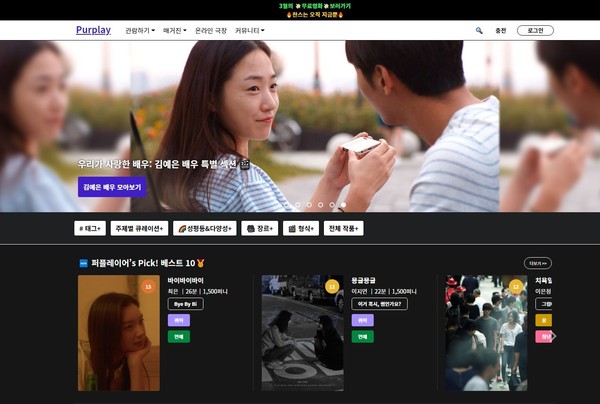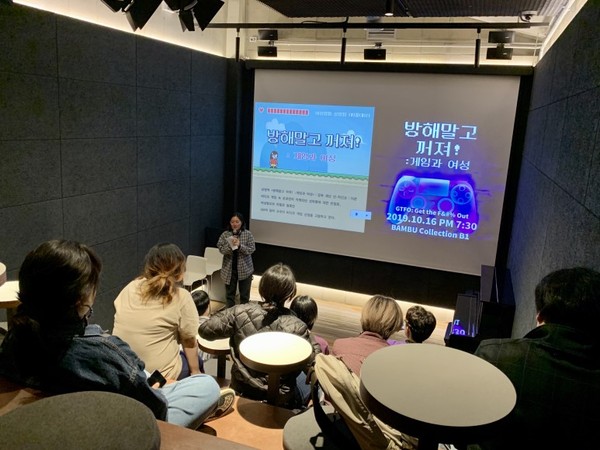
Think about the films that you have watched. How many films have female protagonists and handle women's problems? Probably few films were woman-centered. Whether you are a movie person or not, we know that we cannot easily encounter films about women, unless we specifically look for them. Then, have you ever thought about this? In this situation where it is difficult for films about women to succeed, a woman has started making woman-only films. She has taken the lead in putting them out for the public to watch. Now, SMT will tell you about Cho Ilji and Purplay.

Before our interview, please introduce yourself and Purplay to our readers.
Hi, Sookmyungians. I'm Cho Ilji, the CEO of Purplay. I was secretary-general of the Korean Queer Film Festival, and now I have been running Purplay since 2017. Our Purplay company is the only female movie streaming platform, and 'Purplay' is a compound word of purple and play. With the slogan 'A Female Movie Is Always Nearby,' we discover domestic and foreign films about women that are relatively unknown in the movie market and try to promote them.
Why did you establish 'Purplay,' a woman-centered OTT service?
I watched a film at a women's film festival and recommended it to my acquaintance, but there was no place to watch it. So, I started 'Purplay' because of a thirst for the films I like. We got together and tried to create a channel in which people could easily find female-focused films. We realized there was no room to produce and show films about women. It is difficult to find movies that women have produced because they are not distributed through traditional channels. Therefore, we started showing domestic films produced by female directors. Not only films about women, but we also deal with films about gender equality and diversity that are difficult to find in the movie theater.

On Purplay, we can find many movies through tags related to women and a category named 'gender-equality and diversity.' How do you select content for Purplay?
We select a film that has a high gender equality and diversity quotient. In this process, we apply our own 20 standards, especially the Bechdel Test that judges the gender-equality quotient, and the F-rating which measures how actively women participate in the movie. Through tags, curations by topics, and the gender equality and diversity quotient, we recommend the films to our customers.
Unlike other OTT services that charge a fixed fee every month, Purplay introduced an independent payment system, the 'purney system.' What is this, and why did you introduce this payment model?
The main attraction of existing OTT services is their original productions and series. These series are important to justify the next payment. Their purpose and goal are different from ours. So, we use a payment-per-film system, not a monthly fixed system. Our classifying and recommending system is also different from other subscripted platforms. They have a structure that is familiar to 'distributors.' Even if the number of consumers increases, the profit of the distribution company increases, not that of a creator. And because platform companies are not transparent with the public about which content is popular, it is natural for them to have information asymmetry. Only they know. That also differs from our values. We have many other differences with OTTs, including gender equality, diversity, a purney system that minimizes the discomfort of payment-per-film, review writing, and gifting an admission ticket to friends.
In addition to Purplay, a web magazine "Purzoom" and a newsletter "Purpleletter" are also published. What made you start those services?
The female film web magazine Purzoom has a variety of stories about woman-centered films, including interviews, filmmaking information, reviews, and criticism. There isn't much opportunity to hear the stories of the directors who make films about women and the stories they wanted to share with the audience. It's playing a role in quenching this thirst. Purzoom also serves as a window to introduce Purplay's service in more depth and detail. And Purpleletter began with the slogan, "One female film a week!" with the intention of watching at least one female movie a week. It is a newsletter that curates hidden female films and is delivered to members' e-mails once a week.

In the situation where large-scale OTT services are already established in the market, probably there are many difficulties as a start-up OTT. Since you established Purplay, what was the hardest time for you?
As you know, there are difficulties because of prejudice against women. Many people have asked me why I chose "female films," and even some people said that I will be short-lived. Many malicious comments are also made when our articles are published. However, unless we shed light on the films about women, they cannot become well-known. We must talk about them so that they can gain exposure. There have been many difficulties, but thanks to the people involved and audiences who support us, we have endured until now. Another problem is related to capital, technology, and the labor force. Because global companies started with an abundance of them and we did not, there are lots of hardships. Additionally, as consumers experience Netflix and YouTube, their technical satisfaction level increases. Therefore, we do our best to solve any technical problems.
How did you overcome that moment?
Though I cannot point out something special, I am always supported and thanked. The source of my power is the people who encourage me. I can remember the moment when I made a contract with a director when the business was in its infancy. Along with the document, the director included a letter. She said to me, "I will support you, so never give up." I was really thankful to her. Still, I remember that moment and always do my best. Also, I participated in many events, including the women's film festival, to promote Purplay. Whenever I participate in such events, many people come up to me to offer support and bring me coffee. Some writers who are fans of Purplay sent newly published books with their autography to me and left cheerful comments on Purplay. Even now, some send me their new books or leave positive reviews. I always appreciate them.
On the other hand, when providing the 'Purplay' service, what was the most rewarding moment?
Most recently, in October last year, Purplay won the "Gender Equality Culture Support Award" group category at the 2021 Gender Equality Culture Awards. I knew that my goal was not in vain, that of making female-focused films enjoyable in daily life and spreading a gender-equal culture through content. And I was touched that a lot of people were right with us.

Many films about women are being produced now, but it seems that there are still obstacles. In your opinion, what are the problems in the current female film industry, and what is needed to improve them?
If you look at the Korean film industry, gender stereotypes and gender imbalance are at work widespread in the system. Movies are popular media that anyone can easily watch. When content containing gender stereotypes appears, people can unknowingly absorb them. That's why more works by female directors should be released and get attention. When you look at 360 films in the Purplay service, the percentage of independent films and short films is much higher than that of feature films. The reason why there are many independent/short films is that there are not many feature films produced about women. Therefore, Purplay focuses on discovering hidden female films and providing more opportunities for female directors. That way, talented women will do bigger things in the movie industry. The more female directors and creators there are, the more female narratives and more female actors there are. I hope more female creators will make better women's films and spread the culture of raising awareness of gender equality.
Among the films curated by Purplay, please tell me some films you would like to recommend to Sookmyungians.
I recommend <The Shuttle run>, <Her Bath>, and <Audition>. I like movies where child actors are the main characters. Movies are a world written from the perspective of adults, but those works make me think about what it's like to film from a child's point of view. A real female film tells us about someone's alienation and eventual discomfort. And I also want to recommend some films by female animation directors, <Drawing the World>, as a Purplay original series, and <An Algorithm>, which recently started on the service.
Then, what are your next plans or goals?
While running Purplay, I'm going to do a metaverse connection business that fits the trend of the times. I am planning a festival-specialized OTT that can hold film festivals in the metaverse. Anyone can enjoy film festivals easily in the virtual space. Through connections with women's companies or organizations that our users will like, I will build a specialized metaverse that fits them. Also, this year, I am going to create a community about women's movies. As part of that, I started a meeting called 'Deokjil Club.' It's the first movie group that Purplay is trying to make and is a community where people talk about their favorite movies, directors, and actors and share each other's perspectives and tastes. Deokjil Club will continue this year.

Lastly, would you please leave any words for Sookmyungians?
I've seen many women over-censoring themselves despite their outstanding abilities. There are a lot of people who think they're lacking even though they prepared well. If you have something you want to do, don't hesitate to try it. Once you start something, it will develop naturally, and some people will help you or be with you. We are all more capable than we think. I hope we can encourage and help each other more, do things, and live in various ways. If there is anything you want to do, I would like to tell you not to hesitate or remain unfamiliar with it, but to actively go out to do it.
CHO ILJI
- An activist of Mapo FM (2010~2016)
- Executive Secretary of Korea Queer Film Festival (2014~2020)
- CEO of Purplay (2017~)
Park Sung Iyoung / Editor-in-Chief
smt_siy@sookmyung.ac.kr
Lee Han Jiwon / Cub Reporter
smt_hjw@sookmyung.ac.kr


